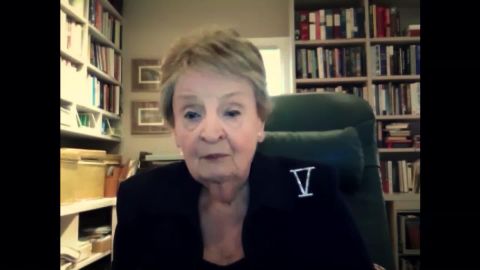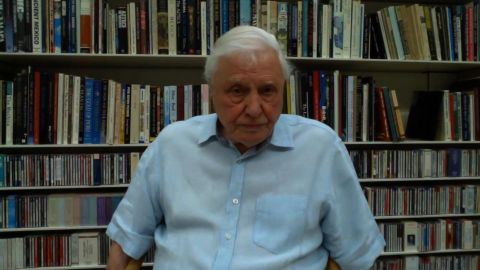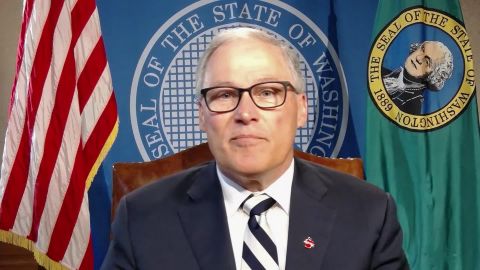Read Transcript EXPAND
CHRISTIANE AMANPOUR: Our next guest once called the United States the indispensable nation when it comes to leading global action. Yet President Trump has shown no interest in this role. As the first female U.S. secretary of state, Madeleine Albright spent her career using the power of American diplomacy to solve international crises. Our Walter Isaacson spoke to her about the urgent need for return to that model, which she lays out in her new book, “Hell and Other Destinations: A 21st-Century Memoir.”
(BEGIN VIDEOTAPE)
WALTER ISAACSON: Secretary Albright, thank you so much for joining us.
MADELEINE ALBRIGHT, FORMER U.S. SECRETARY OF STATE: It’s great to be with you, Walter. Really looking forward to this.
ISAACSON: Thank you. This coronavirus has caused an immune reaction, you could call it, around the world. And that immune reaction is to retreat towards tribalism, to retreat towards nationalism. Why is that happening?
ALBRIGHT: One of the things that I have talked about is that there have been two mega-trends and their downsides. So, one mega-trend has been globalization, there’s no question. And many of us have benefited from that. The downside of it is, is that it’s faceless. And people are looking for their identities. And there’s nothing wrong with really wanting to know who you are and where you come from and all that, but if my identity hates your identity, then it leads to hypernationalism, and that is very, very dangerous. So we have seen more of that recently, due to the facelessness, but now exacerbated also by the fact that we are theoretically trying to fight a common enemy, whereas we are behaving as if viruses don’t — you know, viruses don’t understand borders. They are all over the place.
ISAACSON: Even before this crisis, we were seeing the rise of authoritarian leadership from Turkey, maybe all the way around the globe. Why did that happen? And who stands out for you in that regard?
ALBRIGHT: Well, I think that it happened because we have not handled the role of technology in our society very well. And you and I, Walter, have spent so much time in the past talking about what happened to the social contract, whether people that are part of a country where the government is supposed to provide them with a certain amount of living standards, the government doesn’t live up to its responsibilities, and the people don’t live up to their responsibilities. And so I think we have been in an era where technology was misunderstood, where societies are divided by where they get their news. And so then you find leaders who are — take advantage of it, who are opportunists, and then create their societies according to that. Viktor Orban is one of them. Erdogan in Turkey is another, Duterte in the Philippines. And we have seen it in a variety of places. And I think that trying to divide society, rather than try to find common answers, is one of the steps towards authoritarianism.
ISAACSON: What do you feel about China’s response to the virus, whether they were transparent and open enough?
ALBRIGHT: I do think, Walter, that the Chinese are going to have to answer for a lot of issues to do with where this all came from and when they said what. But what I’m very concerned about now is, while we have to look into that, we really have to figure out how we move in the future and what the plans are. And given that it is true that we’re interconnected, we are actually very dependent on the Chinese supply chains and how we operate together. And I was recently asked, what would happen if the Chinese came up first with a vaccine? Would we say we wouldn’t deal with it because it was Chinese? And so I think we have to figure out how they ultimately take responsibility for this, but, at the moment, I think we need to look for paths where we can cooperate to resolve this crisis.
ISAACSON: How did you feel about America and the Trump administration pulling out funding for the WHO?
ALBRIGHT: Well, I think it is so counterproductive. We can’t do anything if we’re not at the table. And by blaming the WHO and saying that we’re not going to contribute, we are contributing to one of the mechanisms for dealing with the issue of the virus. And so it is basically counterproductive in every single way, lowers our influence, and just makes it clearer that the U.S. is AWOL in a number of different ways of trying to resolve what are the really big problems of the 21st century.
ISAACSON: Is the criticism of the WHO, which is that they were soft on China in the very beginning, valid? And do you think some of the steps that Trump has taken might be appropriate because of that?
ALBRIGHT: First of all, we have to remember that the WHO is the United Nations organization based on support by the nation states. And I think that like, every part of the U.N., I think there are questions about it. I have said, now, people and institutions in their 70s need a little refurbishing, and the U.N. is — has a 75th anniversary right now. And I think people should look into the governance of various parts of it. There are lots of questions about how the Security Council is operating and the General Assembly. And I do think that the secretary-general is also being questioned about what he’s doing. So, I do think is worth looking at. But the point that I wanted to make was, if there are issues, then by the United States deciding that we are not going to do our part, that we are backing off in terms of paying some of the vol — there’s the required funding and also voluntary funding — we will not have the influence that we need to have to make changes. And I had the — similar an experience when I went to the U.N., was that the U.S. was behind on paying some of our peacekeeping bills, and then Congress unilaterally decided that we would pay less. And so I didn’t have the kind of leverage that I needed to push for certain kind of reform, leaving the British, our best friends, to deliver a line they hadn’t — they had been waiting for over 200 years to say, was, representation without taxation, because you just don’t have the leverage. So I think it was counterproductive generally, counterproductive in terms of what we might want from the WHO, counterproductive in terms of how we resolve what is a terribly difficult problem.
ISAACSON: One of the issues that requires cooperation is fighting global pandemics. And, to me, it’s been surprising that this has weakened international organizations, this pandemic. Do you think, coming out of this coronavirus, we may relearn the importance of having good international organizations?
ALBRIGHT: I hope so. And I know it’s a cliche to say that every crisis is basically an opportunity, is to really see that the only way to resolve this is by dealing with others. So, one of the parts we haven’t even dealt with yet is, what is going to happen in the developing world as the pandemic hits them full strength, because they don’t have the infrastructure to deal with it or they don’t have water to drink, much less to wash their hands in, or their living conditions? And so these kinds of issues can only be solved by partnership.
ISAACSON: The coronavirus crisis has obviously dominated the news and international affairs. But do you think there’s something that’s important that’s being overlooked at this time?
ALBRIGHT: I think an awful lot is being overlooked, frankly. I am worried about what the Russians are up to. They — we are dealing, in Putin, with a former KGB officer who has played a weak hand very, very well, and especially in the Middle East, where we haven’t paid any attention to the kinds of things that are going on in Iran, Iraq, Syria, Saudi Arabia, the whole aspect of the Middle East. And then what the Russians are doing to separate us from our allies in Europe, and their behavior just generally, having launched an anti- satellite missile and various things. I think what I’m most worried about, though, is — to go back to something, is China. I mean, China — I don’t know how many meetings, Walter, I have been in with you where we have talked about the rising China and all the various aspects of that. And I think that they are, when they — when we’re AWOL, they know how to fill the vacuum. And I think we have to be very careful about that. I’m troubled by the things that they are doing in the South and East China Sea, taking advantage of the fact that we are diverted at the moment. And then the fact that we’re not paying to so — paying attention to so many other problems in the world, and they require attention and require our understanding. So, there’s a lot that we’re not paying attention to.
ISAACSON: From your very childhood, leaving what was then Czechoslovakia, spending days of World War II in England with the Blitz happening, and there’s so many other things that have happened to you. Compare this crisis and the need for resilience to other things you have been through.
ALBRIGHT: I was a child during World War II. We were in London during the Blitz. And it was very clear in — at the time how my parents were coping by being resilient. And a statement that I have said about them is that they made the abnormal seem normal. But resiliency was very important. And the similarity, Walter, at the moment is that they or the people of England had no control over bombs being dropped from the sky. They only had control over their own behavior, their mood. And I think we, as well ordinary citizens, don’t have control over the virus, but we do have control over our behavior, whether we follow the guidelines, how we approach this. Do we see it as something that has to be dealt with, and not something that we — that our mood doesn’t make a difference? Resilience. I do think resiliency is kind of the common theme here.
ISAACSON: One of the things that surprises me as well is that resiliency was part of every other crisis we faced. It’s what happened to the England during World War II. And yet, in America, we have polarized so much, even this coronavirus. Even whether or not there would be herd immunity, or even whether or not we should keep a lockdown on for two more weeks becomes a partisan issue. Why is that?
ALBRIGHT: Well, I have been so troubled and dispirited, even though I’m trying to control my mood, about the divisions that are being created on purpose for political reasons. I have been — I am a political scientist. And I kind of love to study how governments operate and decision-making. And the American system is endlessly fascinating. The Constitution is fascinating. People forget that the first article of the Constitution is about the power of Congress. And only the second one is about executive power. But I think that what is happening is, because we, I think, waited too long to deal with the virus, then you get into blame-placing. And that creates automatic divisions between the federal government and the states and the governors, or blaming the mayors, or — it’s a blame game, instead of a solution-finding operation. And it has been totally politicized, I do think, by the president of the United States, which I find very, very sad. And I have been asked whether I think he’s — you know, doesn’t believe in America. I think he’s un- American, because he doesn’t understand our value system, our — and only propagates the divisions, rather than trying to figure out how we find solutions together.
ISAACSON: You have written a new book, which is just coming out, about your life since being secretary of state. And one of the many things you write about is organizing a group of what you could call Madeleine and her exes, meaning former foreign ministers who you dealt with, to keep meeting each year. And I think you met a couple years ago in Versailles. Then you took them to Kansas City this past year. You went from the home of Louis the XIV, who said, “‘L’etat c’est moi,” meaning, I am the state, I’m in charge, I run everything, to the home of Harry Truman, who had a sense of humility that comes from being the president. Is that one of the lessons you feel we should apply today?
ALBRIGHT: I think definitely, because here was a person that had risen to this incredible job through a variety of ways, having served in the military and had a shop, and then he was very political. But I think the best thing about him was, he took responsibility. And one of the things that we saw there was the original sign that said, “The buck stops here,” which he had on his desk, because he knew that being president of the United States ultimately meant that you — that you had responsibility, and that you worked with others. So, there are all kinds of lessons from Harry Truman. I have to say, he was my first American president. We came to the United States November 11, 1948. And he had just been elected in his own right. And so I followed his life and the way he talks and what he did. But his clarity and responsibility is something that I think stands out especially.
ISAACSON: You write that, when you read about an international crisis, you reflectively insert your name in place of the current secretary of state, and think about what you might be doing in this situation. So, let me ask you, what would you be doing now, if you were secretary of state?
ALBRIGHT: Well, it does make me seem very self-centered. But I am interested in what the secretary of state’s role is and how it works. I think that I would actually be doing much more to reach out to those that we have to work with, the partners, and really try to work and do kind of a whole-of-government, from the perspective of the United States, because the secretary of state, with the national security adviser, can set the agenda and bring in other parts of their governments, as well as — meaning foreigners, that want us to deal with, which would be trying to figure out how the intelligence community works together. But I think that we’re not taking advantage enough of the foreign policy capabilities of the State Department, because, in fact, the State Department has been kind of weakened in a number of ways by the number of people that have left or have been asked to leave, and by the funding of it. So I don’t know what the current secretary is doing in terms of trying to help the funding, trying to in fact work with others abroad. I think he’s done some travel, but it’s unclear what he’s doing.
ISAACSON: You’re famous for writing a book about those pins that you wear. In fact, it even became a traveling exhibition, where your pins went on displays in museums around the country. What’s that pin you’re wearing today?
ALBRIGHT: My father was with the Czechoslovak government in exile. And his job was to broadcast over BBC into Czechoslovakia. And he was on BBC all the time. And I was a little girl. And I listened to BBC. And I know the following thing, which is, every broadcast open with the notes, the opening notes, of “Beethoven’s Fifth,” dah-dah-dah-dum. And, in Morse code, that is victory. And so I thought a V for victory against the virus would be something that is appropriate for today and also a reference back to my book.
ISAACSON: Secretary Madeleine Albright, thank you so much for joining us this evening. And stay well.
ALBRIGHT: And you too, Walter. Good to have this with you. Thank you.
About This Episode EXPAND
Sir David Attenborough joins Christiane for an Earth Day conversation about the wonder and fragility of our planet. Washington Gov. Jay Inslee discusses the twin threats of COVID-19 and the climate crisis. Former U.S. Secretary of State Madeleine Albright explains the urgent need for American diplomacy in this time of crisis.
LEARN MORE


